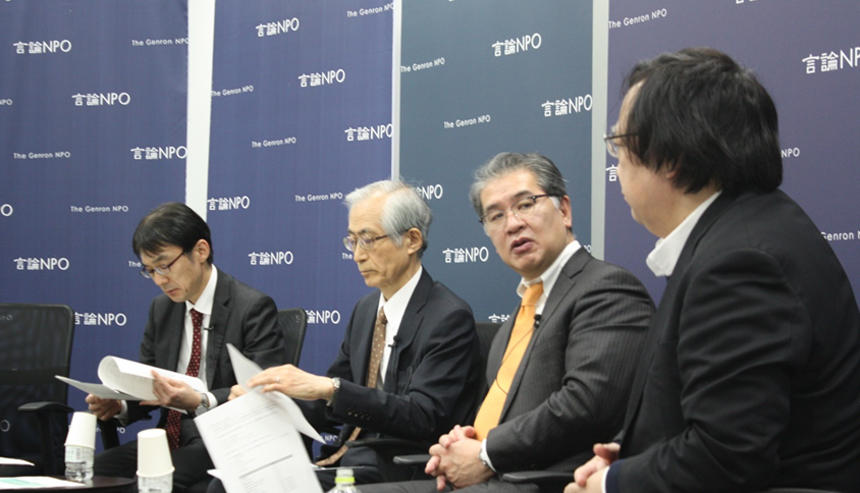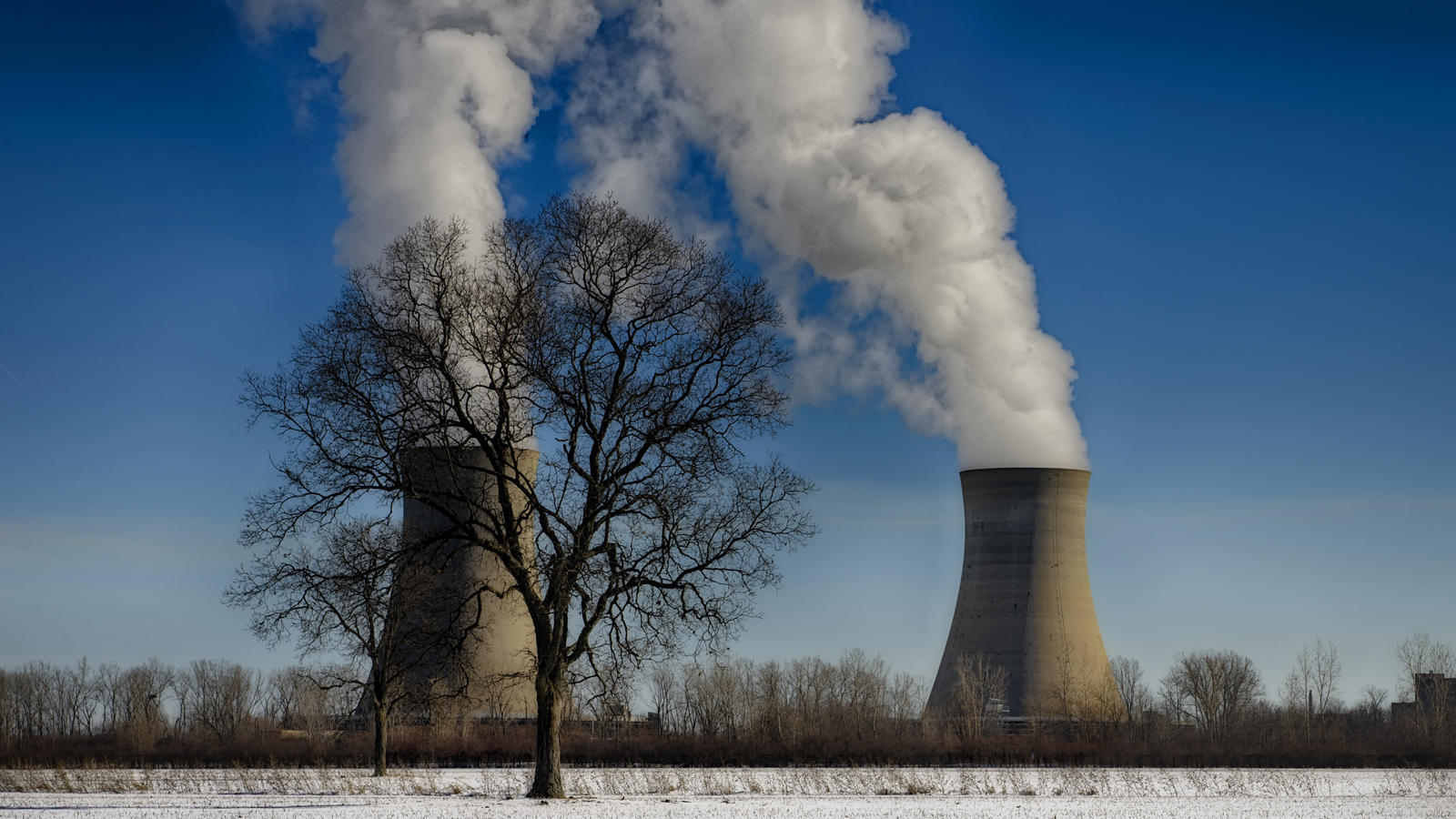On Feb. 27, four Japanese experts gathered to looked at international cooperation on resolving global issues such as trade, nuclear weapons, cybersecurity, and climate change.
Genron NPO president Yasushi Kudo, president of the Genron NPO, which organized the public policy debate series as a pre-forum event for the 2019 Tokyo Forum due for March 3, moderated the discussion, opening the panel with the following statement.
"The globalized world faces various cross-border, non-traditional issues such as cyber-governance and other problems arising from technological innovation, and there needs to be an international cooperative framework and new rules."
Kudo asked the four participants how they felt about the statement, and how they would evaluate international cooperative efforts implemented over the previous year.
Professor Nobumasa Akiyama of Hitotsubashi University suggested that evaluating how well international cooperation worked depended on how much national interests converged. He also added that many major powers may be seeing competition as more beneficial, with some countries possibly believing that, "The risk of being betrayed while cooperating outweighs the benefits."
Akiyama pointed out that the U.S. return to unilateral policies is problematic, but the U.S. stance is "a consequence of the international community relying so heavily on the U.S."
Hironori Hamanaka is a Special Research Advisor at the Institute for Global Environmental Strategies (IGES) and former Vice-Minister for Global Environmental Affairs. Hamanaka stated that in some ways, multilateral governance efforts through the United Nations had functioned as designed. While U.S. President Donald Trump announced that his country would be withdrawing from the Paris Agreement, Hamanaka emphasized that a sub-national movement to adhere to the accord is spreading among businesses and within local and state governments in the U.S. However, he also noted that while the long-term targets of the Paris Agreement are extremely high, there is insufficient drive within each country to meet those targets. There is no clear path forward, and, "No one is likely to step up and lead the effort."

Kudo looked to Tetsuya Watanabe of the Minister of Economy, Trade and Industry (METI) and asked whether people are questioning the very essence of globalization itself. Watanabe responded in the affirmative, pointing to the various global trends, including the tariffs implemented by the Trump administration and Brexit, explaining that, "Post-war, countries prospered on the promise that the global system would expand world markets. However, gaps between the rules and the world economic reality, between the rules and technological innovation, suddenly appeared in 2018 and 2019, and now the rules-based system of international commerce is being questioned."
Kudo expanded the questioning, suggesting that multilateralism and the free order may be approaching a major turning point.
Akiyama responded in terms of the "nuclear order," reminding those gathered that the issue of nuclear weapon development by Iran and North Korea is not a new one. The issue became more tangible, he believes, "because the current system stopped functioning." He added that the U.S.-Russia relationship during the Cold War supported the global governance structure, but that sense of security has since disappeared. Particularly for Russia, he explained, to a certain extent the arms control framework was a means of maintaining parity with the U.S., but as the gap between the U.S. and Russia became more apparent and the Intermediate-Range Nuclear Forces (INF) Treaty broke down, it changed form, and became an incentive for considering an antagonistic stance against the U.S.
"At that point it was no longer possible to disregard North Korea and Iran," he said. "Whether from the perspective of rules-based governance or power-based governance, there were approaching the limits."
In response to a question from Kudo about the potentially declining influence of non-state actors, Hamanaka described an issue that has been recently drawing more attention.
"We have started to see more action on the part of state (i.e. non-national) governments in the U.S., and on the part of local governments, companies and investors, and other non-national government actors in Japan," he said. "I think we may need to find a way of incorporating their voices - to find a multi-layered system of governance in which a diverse array of actors can participate."
The discussion moved to cyber-governance, about which government cyber security policy expert Tomoo Yamauchi said, "There needs to be a fundamental understanding of whether or not cyberspace can actually enrich people's lives."
The cybersecurity strategy proposed by the Japanese government last year is based on the premise that to enrich humanity and society through the use of cyberspace, cyber security must ensure that is safe and sustainable.
Yamauchi said that one problem with cyberspace rules is how national sovereignty comes into the equation, and this is an issue of contention between some national governments. Japan's position is that as the internet is borderless, free circulation of information should be permitted, whereas China and Russia believe the sovereignty of the state should be recognized. Yamauchi said that a number of different groups at the U.N. will be coming together at the end of this year to look into resolving this situation, but Yamauchi is unsure how far developed countries can continue supporting developing countries without neither the sufficient knowledge of cybersecurity nor industry, all while compromising with China and Russia.
Akiyama stated that he sees three dangers regarding the international framework for non-proliferation of nuclear weapons. First, while the minimum objective is to prevent the proliferation of nuclear-armed states, if Trump gives North Korea de facto recognition as a nuclear power, that movement to obtain nuclear weapons will spread throughout the Middle East.
The second danger lies in the fact that the arms control framework between the U.S. and Russia has broken down, whereas the third danger is that the division of opinion between nuclear powers and non-nuclear powers regarding the nuclear weapon ban treaty is widening, and the system is now unstable due to the various major challenges it faces on several quarters.
"The consensus in the international community over nuclear weapons is breaking down," Akiyama warned.
However, Akiyama believes that Japan has a role to play as the only country to have experienced the destruction wrought by an atomic bomb: it should use its geopolitical position at the crossroads of multiple nuclear powers to become a key player.
Regarding climate change, Hamanaka noted that last year's COP24 helped avoid the worst-case scenario of seeing the Paris Agreement falling apart, but suggested that it was only a temporary salve, not a cure, partly because there has been no progress in introducing increased CO2 reduction targets or other necessary resolutions.
He pointed out that no country is taking a leadership role to resolve the issue. Although the U.S. was a driving force behind the initial Paris Agreement, it is now turning its back on the treaty, and it has become more difficult for the international community to implement a united effort.
Regarding issues surrounding cybertechnologies, Yamauchi believes the current situation is due to a lack of proper communication. A dialogue is necessary, but he also wonders if there is enough motivation to fix the issues, noting that the fact that China is an advanced country when it comes to internet technologies. Its willingness to work with the global community in building a harmonized rule structure is unknown and that could lead to major problems in the future.
Meanwhile, Watanabe believes that while the system of commerce is also facing challenges, this is a "chance to build a commercial order based on new rules." He reminded the forum that part of the reason behind the strain in global commerce was the WTO's inability to update itself in response to the increasing gap between the rules and reality, and he said that an update is absolutely essential. As regional-level rules-based frameworks like TPP and the Japan-EU EPA are moving forward, Watanabe emphasized that such successes can be reflected in WTO policy and in systems that are even more multilateral in nature.
Kudo's final question to the panelists was about their opinions on global priorities in 2019.
Hamanaka suggested that the priority should be placed on climate change, his own speciality. While he had offered a slightly pessimistic view earlier in the discussion, he pointed out that UN Secretary General Antonio Guterres is actively tackling climate change issues, and a climate change summit is planned for September 2019. Other major events taking place this year will also provide opportunities to promote international cooperation on the issue.
Akiyama and Watanabe pointed to their own specialities as also worthy of prioritization, but also included cybersecurity due to its connection to other important issues such as national security and the economy.
Yamauchi agreed with that point, adding that as the ties between the real world and cyberspace grow stronger, IT has both the potential to enrich and damage people's lives. In order to avoid the latter, there is an urgent need for the creation of rules and a governing structure.
Kudo brought the session to an end by stating his hope that a forum for the discussion of global issues can eventually be built in Japan.


Post a comment